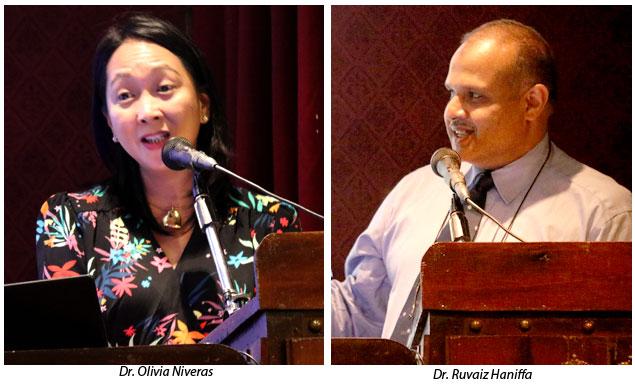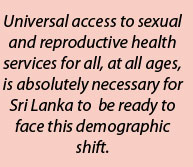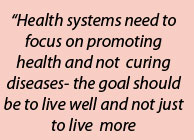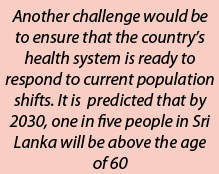
As the world marked the Universal Health Coverage (UHC) Day on Wednesday (December 12), the Sri Lanka Medical Association (SLMA) together with the Ministry of Health, Nutrition and Indigenous Medicine, the UN Family Planning Association (UNFPA) and the World Health Organization (WHO) evaluated the country’s response to its changing demography.
 “Health is the greatest gift,” said the Buddha over 2,500 years ago. That’s the gift that Universal Health Coverage (UHC) tries to endow on the global population – quality health services sans financial hardship for everyone, irrespective of who they are, where they live, or how much money they have. This year, it is celebrated under the theme ‘Unite for UHC- Now is the Time for Collective Action.’ The UHC Day is celebrated on December 12, each year, to mark the historic UN resolution of December 12, 2012 which urged all countries to accelerate progress toward Universal Health Coverage as a priority for international development.
“Health is the greatest gift,” said the Buddha over 2,500 years ago. That’s the gift that Universal Health Coverage (UHC) tries to endow on the global population – quality health services sans financial hardship for everyone, irrespective of who they are, where they live, or how much money they have. This year, it is celebrated under the theme ‘Unite for UHC- Now is the Time for Collective Action.’ The UHC Day is celebrated on December 12, each year, to mark the historic UN resolution of December 12, 2012 which urged all countries to accelerate progress toward Universal Health Coverage as a priority for international development.
Health experts gathered at the Sri Lanka Medical Association (SLMA) auditorium last Tuesday, discussed whether the country’s health system is ready to respond to the population’s demographic shift- Sri Lanka is known to have the fastest aging population in all of South Asia.
The panel of experts consisted of the President of the SLMA and Head, Family Medicine Unit and Consultant Family Physician at the Faculty of Medicine, University of Colombo, Dr. Ruvaiz Haniffa, Consultant Community Physician, Directorate of Youth, Elderly and Disability of the Health Ministry, Dr. Shiromi Maduwage, UNFPA Deputy Representative Dr. Madusha Dissanayake and WHO Public Health Administrator, Dr. Olivia Nieveras. It was moderated by Dr. Palitha Abeykoon, Chairman, National Authority on Tobacco and Alcohol (NATA).
WHO Public Health Administrator, Dr. Olivia Niveras praised the country for its ‘significant health achievements’ during the past few decades. Social investments such as female education, commitment to control non-communicable diseases, and mother and child care had brought Sri Lanka to a high position (within the region) where health care is concerned. However, the need is to take care of its rapidly aging population, she said.
Dr. Palitha Abeykoon, said that 20.8% of the country’s population will be over 60 by 2031. In contrast, the population below 20 years of age will be 25.8 5%. It is within the last five years of an individual’s life that around 90% of medical expenses arise.
Stressing the need to reduce the out of pocket health expense component in the country, Dr. Abeykoon said that it should be brought down to below 25%. At present, the out of pocket health expenses stand between 40 and 45%.
Dr. Ruvaiz Haniffa said that good health is a human right and not a privilege. He emphasized the need is to transform health systems from hospital centered and illness- based, to people centered systems. “Health systems need to focus on promoting health and not curing diseases- the goal should be to live well and not just to live more. The first level of future health care should become increasingly closer to where people live and work as our needs change across life stages,” Dr. Haniffa said.
 He stressed that the country is on a good trajectory towards Universal Health Coverage by investing in Primary Health Care(PHC) reorganisation. PHC is the most effective and efficient way of achieving good health for the population. According to him, the country’s biggest challenge lies in the development of the Primary Curative Care Sector. It is necessary to train medical officers, doctors and other medical facilitators in this process. A Health Care System Strengthening Project has been initiated this year, to provide solutions for problems in the Primary Curative Care Sector.
He stressed that the country is on a good trajectory towards Universal Health Coverage by investing in Primary Health Care(PHC) reorganisation. PHC is the most effective and efficient way of achieving good health for the population. According to him, the country’s biggest challenge lies in the development of the Primary Curative Care Sector. It is necessary to train medical officers, doctors and other medical facilitators in this process. A Health Care System Strengthening Project has been initiated this year, to provide solutions for problems in the Primary Curative Care Sector.
Another challenge would be to ensure that the country’s health system is ready to respond to current population shifts. It is predicted that by 2030, one in five people in Sri Lanka will be above the age of 60. This demographic transition makes Sri Lanka the most rapidly aging population in the South Asian region. This is a result of the country’s continuous investments to enable people to live longer. However, it is important to ensure that health systems support the needs of the increasing elderly population.
Dr. Haniffa trusts that the Electronic Medical Information Management Systems (EMIMS) would pave the way to UHC in the country. The SL government has already laid the foundation for EMIMS. Inability to trace the individual or family medical history hinders effective diagnosis and treatment and EMIMS is introduced to avoid this bottleneck. The E- Health Records will be introduced to 300 Government Hospitals by 2019.
Under this policy, the e-health Card has been introduced- it contains the unique Personal Health Number of each patient and stores important medical information of the card holder. It will enable health data to be available safely and rapidly. This will have special significance in an emergency situation.
Establishing Smart Health in Sri Lanka is a future project aimed at taking the country to its UHC goals. It harnesses the power and potential of sensing, computing and communication technologies, software modeling and Big Data Analytics for personalised, participatory, predictive, and preventive health care, and to establish a digital health ecosystem.
Smart PHM is another big step in UHC. Public Health Midwives (PHMs) play an important role in the Primary Healthcare System in Sri Lanka. Under the Smart PHM initiative, tablet computers will be given to PHMs so as to improves the quality of data, and availability of information.
Another contributory factor promoting universal health could be the ban on the sale of single sticks of cigarettes with the intention of reducing cigarette consumption to around 20% in the next four years, which will prevent at least 6,000 deaths annually. Cigarette consumption among adult males has decreased from around 29% in 2011 to around 24% in 2015.
 Dr. Madusha Dissanayake, Assistant Representative of UNFPA Sri Lanka, highlighted the need for access to quality reproductive health services. She said, “It is when youth make informed life decisions now, that they can be economically empowered to age with dignity. Therefore, universal access to sexual and reproductive health services for all, at all ages, is absolutely necessary for Sri Lanka to be ready to face this demographic shift.
Dr. Madusha Dissanayake, Assistant Representative of UNFPA Sri Lanka, highlighted the need for access to quality reproductive health services. She said, “It is when youth make informed life decisions now, that they can be economically empowered to age with dignity. Therefore, universal access to sexual and reproductive health services for all, at all ages, is absolutely necessary for Sri Lanka to be ready to face this demographic shift.
It allows people to age actively and healthily, which in return will help the health systems.”
She emphasised the role of the Government when providing UHC. The Government must ensure that all essential medicines are available at all the levels, trained health staff are equitably distributed, protect the poor from having to pay for unaffordable health services. Interventions should be evidence based, effective and safe, with information available for decision making at all levels.Primary care should be reorganised to provide equitable access to services, disparities in service provision minimised, and care services should be people- centered, to ensure people’s engagement and participation.
She also stressed the responsibility of the community for the successful achievement of UHC. It could succeed only if the individuals, civil society and health workers fulfill their role, she stressed. This includes communication of one’s needs, opinions and expectations to local policy-makers, politicians, ministers and other people representatives.
She invited the community to raise their voice to ensure community health needs are taken into account and prioritised at the local level including through social media, inviting civil society organisations to help raise community awareness, organising activities like discussion forums, policy debates, concerts, marches and interviews to provide people an opportunity to interact with their representatives on the topic of UHC via media and Social media.
